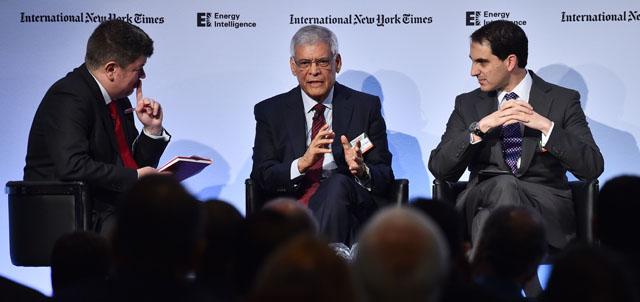You are here
Oil hits five-year low
By Agencies - Dec 01,2014 - Last updated at Dec 01,2014
LONDON — Brent crude oil fell on Monday to a five-year low below $68 before recovering most of the losses as investors looked for a price floor after last week's decision by the Organisation of the Petroleum Exporting Countries (OPEC) not to cut production.
US crude and Brent have fallen for five months in a row, oil's longest losing streak since the 2008 financial crisis.
"The market is still very much in panic mode," said Energy Aspects' chief oil analyst Amrita Sen. "Once we get over the panic, Brent prices will probably stabilise at around $65-80 a barrel in the short term."
Brent hit a low of $67.53 a barrel, the lowest since October 2009, and was down 7 cents at $70.07 a barrel by 1347 GMT. US crude was up 19 cents at $66.34 a barrel, having slipped to an intraday low of $63.72, the lowest since July 2009.
Saudi Arabia, OPEC's most influential member blocked moves by some smaller producers to curb oil output in response to huge oversupply in world markets.
Oil lost more than 12 per cent after OPEC's decision last Thursday.
Data suggested the new price environment has hit fast-growing US shale oil production, the main driver of global production growth in recent years, with a 15 per cent drop in permits for new wells in November.
"The market is still looking for a new equilibrium below $70 [a barrel], which is a little surprising given that, with the current prices, much of the shale oil production in the US, or part of it, will be unprofitable," Commerzbank analyst Eugen Weinberg said.
With oil prices down about 40 per cent since June, the impact is being felt around the world as oil producers from Iraq to Nigeria revise 2015 budgets to reflect lower prices.
Slower-than-expected growth in China's manufacturing sector may add further downward pressure on oil. China's official Purchasing Managers' Index (PMI) slipped to 50.3 in November, a government study showed on Monday, lower than analyst forecasts of 50.6.
"In the fourth quarter, oil markets have lost the support of both the invisible hand of the US Fed and OPEC," Petromatrix analyst Olivier Jakob said, referring to the Federal Reserve's move to phase out monetary stimulus for the US economy.
Separately said it was content with the group's's decision to maintain output despite a supply glut and plunging prices.
The council of ministers "expressed satisfaction at the decisions that reflected the cohesion and solidarity of the organisation", the official Saudi Press Agency (SPA) said.
The Cabinet was briefed on last Thursday's meeting of the 12-member OPEC in Vienna, it added.
The group which pumps one-third of global oil decided to keep production at 30 million barrels a day, sending US oil prices down more than $4 in Friday opening trades after the meeting, a selloff that continued when markets reopened on Monday.
OPEC's poorer members including Venezuela had sought a production cut to protect their revenues.
SPA said the Saudi Cabinet highlighted "that the kingdom pays attention to the stability of the international market, and that its policies are based on the short- and long-term economic interests of the kingdom".
It added that "cooperation by OPEC and non-OPEC producers is a joint responsibility" to achieve a stable market.
Analysts had said Riyadh was content to see American shale oil producers — and even some members of the group — suffer from low prices while it tries to hold on to market share in an increasingly competitive business.
Saudi Arabia is economically strong enough to withstand lower prices, the analysts said.
Related Articles
Crude prices came under renewed pressure on Monday, and Brent hit five-year lows of nearly $60 a barrel after producers grouped under the Organisation of Petroleum Exporting Countries (OPEC) said it would stick to its decision not to cut output despite fears of a world awash in oil.
Oil production by members of the Organisation of Petroleum Exporting Countries (OPEC) is unlikely to change much in 2015 and there is no need to panic at the crude price drop, OPEC's secretary general said on Wednesday, adding to indications the exporter group is in no hurry to cut output.
World oil prices slid another 4 per cent to new five-year lows on Monday, as expectations of a deeper slump next year and a prediction by a core member of the Organisation of Petroleum Exporting Countries (OPEC) that crude will remain at $65 for several months triggered another round of selling.












